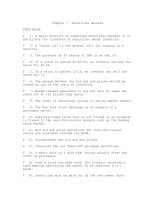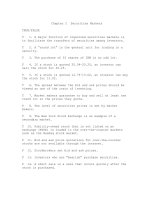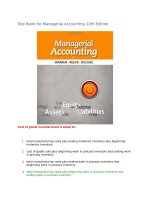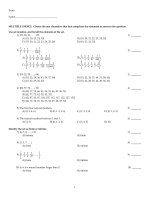Test bank investments; an introduction 12th 12e herbert mayo
Bạn đang xem bản rút gọn của tài liệu. Xem và tải ngay bản đầy đủ của tài liệu tại đây (91.93 KB, 3 trang )
Chapter 1 An Introduction to Investments
TRUE/FALSE
T 1. The investor should specify the objectives of
investing.
T 2. The terms "investing" and “trading” refer to
purchasing and selling securities.
T 3. Investments are made in anticipation of a return.
T 4. The anticipated return and the realized return often
differ.
F 5. Capital gains are the sole source of the return on an
investment.
T 6. Risk is the uncertainty that the realized return may
differ from the expected.
T 7. Stocks are initially sold in the “primary” market and
subsequently traded in the “secondary” market.
F 8. Liquidity refers to the ease of selling a stock for a
capital gain.
F 9. Efficient markets suggests that investors will
outperform the market consistently.
F 10. An informed investor can expect to consistently
outperform the market.
T 11. CFA is a professional designation for individuals
seeking positions as portfolio managers.
T 12. Portfolio assessment should include measures of both
risk and return.
MULTIPLE CHOICE
d 1. Reasons for saving and investing include
1. need for funds to meet emergencies
2. retirement income
3. desire to leave an estate for children
a. 1 and 2
b. 1 and 3
c. 2 and 3
d. all of the above
a 2. Which of the following is an investment as defined
by an economist?
a. equipment
b. land
c. stock
d. savings account
a 3. Which of the following is not an investment in the
layperson's general use of the term?
a. equipment
b. land
c. stock
d. savings account
d 4. Many investments such as stock have common
characteristics including
1. existence of secondary markets
2. risk
3. potential for capital gains
a. 1 and 2
b. 1 and 3
c. 2 and 3
d. all of the above
d 5. Risk
a. depends solely on price fluctuations
b. should be maximized to increase returns
c. is reduced through specialization
d. refers to the uncertainty of returns
b 6. Financial investments are made in efficient markets.
The existence of these markets suggests that
a. investors cannot earn superior returns
b. investors cannot expect to outperform the market
consistently
c. securies prices are random
d. bearing additional risk will not increase return
d 7. Diversification reduces
a. income
b. capital gains
c. taxes
d. risk
c 8. Trading implies
a. frequently buying securities
b. frequently selling securities
c. frequently buying and selling securities
d. investing









